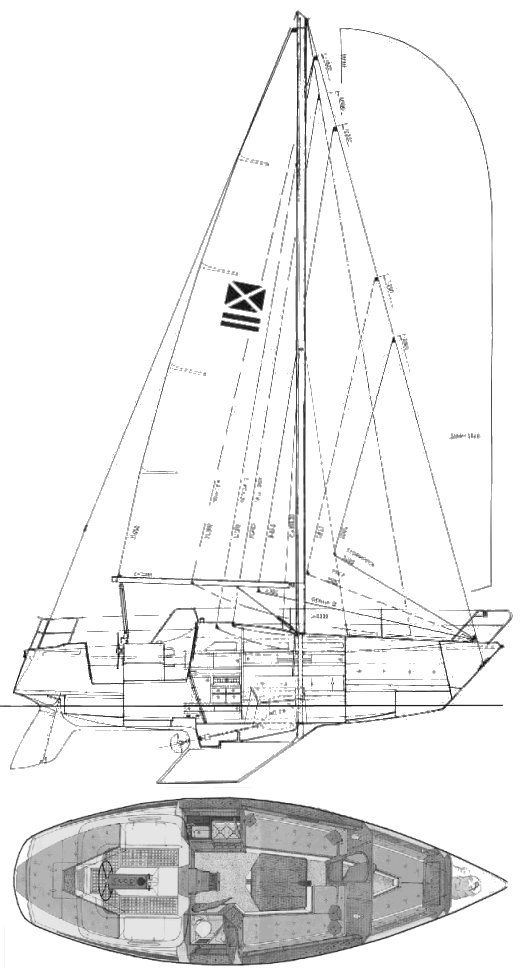The Maxi 95 stands as a quintessential example of Swedish yacht design, embodying a blend of comfort, safety, and capable performance within a compact cruiser. Designed by the acclaimed Olympic medalist Pelle Petterson, and built by Maxi Yachts, this masthead sloop quickly gained a reputation for its generous interior volume and robust construction. It was conceived as a versatile family cruiser, well-suited for both coastal exploration and more adventurous offshore passages.
Maxi 95 Information, Review, Specs

- Make
- Maxi
- Model
- 95
- Number Built
- 1600
- Production Year(s)
- 1974 - 1983
History and Design
The Maxi 95 entered production in 1974 and remained a popular model until 1983, with approximately 1600 units built. The design ethos behind the Maxi 95, like all Maxi models, was heavily influenced by its founder, Pelle Petterson, who aimed to create yachts that harmonized comfort, safety, and speed. Petterson's comprehensive vision as both a sailor and a designer is evident in the boat's balanced characteristics. During this era, Maxi Yachts, known for its commitment to accessible yet capable cruising, emphasized durable fiberglass construction, a hallmark that the Maxi 95 clearly exhibits. While there isn't evidence of distinct MkI or MkII versions, the enduring production run allowed for minor refinements over the years, consistently adhering to its core design principles.
Sailing Performance and Handling
The Maxi 95, with a sail area to displacement ratio of approximately 14.37, is characterized as a moderate performance cruiser, rather than a light-air speedster. This ratio indicates that while she can move well in a breeze, her design prioritizes stability and comfortable motion over outright speed in very light winds. Her ballast to displacement ratio of about 0.37 suggests a decent level of stiffness, enabling her to stand up to a good amount of wind without excessive heel. With a displacement to length ratio around 252, the Maxi 95 falls into the category of a moderate to heavy displacement cruiser for its size, contributing to a solid and predictable ride. Owners often describe the Maxi 95 as a well-behaved and stable boat, providing a comfortable motion in various sea states, making it suitable for short-handed sailing. It is considered to be a very safe and sound sea boat.
Accommodations and Layout
Despite its modest length overall of 31.17 feet, the Maxi 95 is renowned for its surprisingly spacious and thoughtfully arranged interior. Descriptions and floor plans often highlight its generous space and solid construction. The typical layout includes sleeping accommodations for up to six people across two cabins. Forward, a V-berth provides a comfortable sleeping area. Aft of the V-berth, the main salon usually features a convertible dinette and a linear settee, offering ample seating and additional berths. The galley, often located to port, is functional and includes a sink, stove, and icebox. Opposite the galley, a dedicated navigation station is commonly found. The head, typically situated between the salon and the V-berth, usually includes a marine toilet and a basin. Headroom is notably good for a boat of this size, with some models reportedly offering around 6 feet 6 inches of maximum headroom. The interior generally features traditional, well-made finishes, often utilizing wood trim, which contributes to a warm and inviting atmosphere. Storage is typically sufficient for a cruising couple or small family.
Owner's Perspectives
Owners of the Maxi 95 frequently praise its robust build quality and its dependable performance as a family cruiser. Many appreciate the solid fiberglass hull and deck construction, which contributes to a feeling of security, particularly in challenging conditions. The comfortable motion in a seaway and ease of handling, even for short-handed crews, are commonly cited strengths. The interior space is consistently highlighted as a major positive, making the boat feel larger than its specifications suggest and providing ample room for extended stays. The design by Pelle Petterson is often lauded for its practicality and seaworthiness.
However, like any boat of its vintage, the Maxi 95 can have recurring issues. A notable aspect mentioned by owners is the tendency for original deck fittings to require re-bedding over time due to potential leaks. Some owners have also noted that the original engine, often a Volvo Penta MD11, while reliable, may eventually require maintenance or replacement given its age. Additionally, some interior elements, such as the design of cabin doors, have been mentioned as having less than ideal functionality, being either fully open or fully closed. Despite these minor points, the strong community and enduring popularity of the Maxi 95 in the secondary market attest to its overall appeal and a rewarding ownership experience for those who appreciate a well-built, comfortable, and capable cruising yacht.
Measurements
Construction & Hull
- Construction Material
- Fiberglass (Solid)
- Hull Type
- Monohull Sailboat
- Keel Type
- Fin
- Rudder
- 1x Skeg-Hung
- Ballast
- 3527 lbs
- Displacement
- 9480 lbs
- Water Capacity
- 26 gal
- Fuel Capacity
- 16 gal
Engine
- Engine Make
- Volvo Penta
- Engine Model
- MD11
- Engine Type
- —
- Engine HP
- 25
- Engine Count
- 1
- Drive Type
- —
- Fuel Type
- Diesel
Rig & Sails
- Rig Type
- Masthead Sloop
- P (Main Luff)
- 34.8 ft
- E (Main Foot)
- 11.2 ft
- I (Foretriangle Height)
- 38 ft
- J (Foretriangle Base)
- 10.9 ft
- Forestay Length (est)
- 39.53 ft
- Main Sail Area
- 194.88 sqft
- Foretriangle Sail Area
- 207.1 sqft
- Total Sail Area (Reported)
- 402 sqft
- Total Sail Area (Calc)
- 401.98 sqft
Dimensions
- LOA
- 31.17 ft
- LWL
- 25.59 ft
- Beam
- 10.5 ft
- Draft
- 5.08 ft
- Max Headroom
- -
- Air Draft
- 43.96 ft
Calculations
- Hull Speed
- 6.78 kn
- Pounds per Inch Immersion
- 960.08